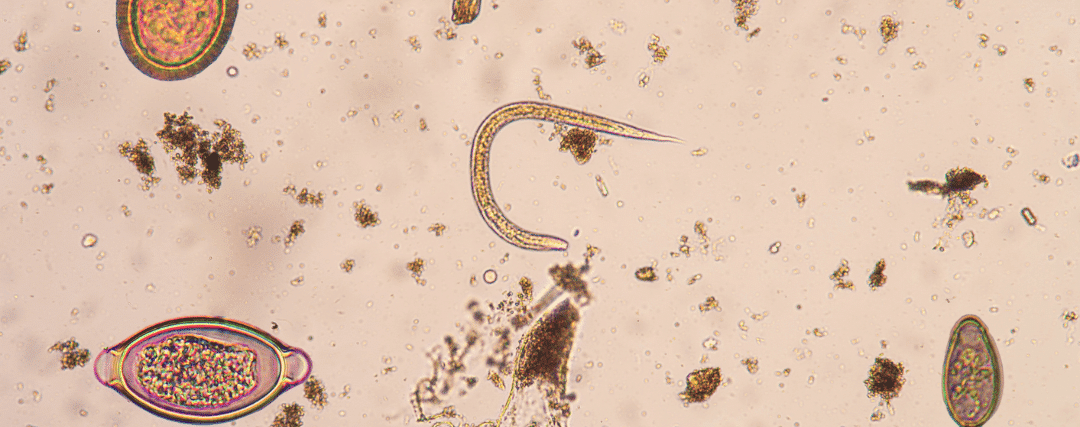Did you know that an estimated 3.5 billion people have parasites living inside of them?
What exactly is a parasite, you ask? Parasites are organisms (some small and some disturbingly large) that can live in our bodies and obtain their food from their host (us), by absorbing the nutrients of the host (us), at the expense of the host (still us).
There’s a common misconception that parasites and parasitic diseases must be rare and difficult to contract. However, these damaging free-loaders are more common than you may think (up to 3.5 billion people are estimated to be affected), and they can wreak havoc on much more than just your digestive system.
Parasites differ in length and size, ranging anywhere from mere millimetres to 80 feet long. That’s right; you could have another living organism making itself at home inside you that is up to 24 meters in length! Parasites may inhabit our bodies for several weeks, or, unfortunately, they can also leach off us for many years!
Let’s learn a little more about parasites, how they come to inhabit us, and the damage they can leave in their wake.
TYPES OF PARASITES:
There are three main classes of parasites that can cause disease in humans: protozoa, helminths, and ectoparasites. Helminths are multi-cell parasitic worms such as pinworms, hookworms, tapeworms, and roundworms, and ectoparasites are parasites that live on the outside of their hosts (such as fleas). Protozoa are the most deadly and least-detectable type of human parasite.
Protozoa make up more than 90% of all parasitic infections. They are single-celled organisms that can cause serious damage to their host. In fact, it is estimated that Protozoa parasitic infections have resulted in more death throughout history than any other cause (including wars and famine). The most well-known deadly parasitic protozoa is plasmodium, which causes malaria.
HOW DO WE GET PARASITES?
Did you know that parasites are the most common form of life on Earth? Scientists believe that over 80% of all living things are parasites.
Most people may not realise how easy and common it is to be infected with a parasite. Parasites can be found living almost everywhere (in the air, soil, food, water, waste, and living on other animals), and they can move around quite easily. It’s also an untrue myth that you must lack hygiene to contract a parasite; some common parasites (such as head lice), actually prefer a clean environment.
Some of the most common ways you can get parasites are:

-Travel: travelling to countries with underdeveloped sanitation and poor quality drinking water is one way to pick up a parasite.
-Swimming: Some parasites thrive in water, and can be easily contracted by accidentally swallowing water from a river, hot tub, or public pool (unfortunately, chlorine doesn’t kill them all).
-Drinking contaminated water: This is something to be more wary of while travelling. Although contaminated public water is less common in developed countries (such as Australia), it can happen. Especially after flooding, which can leach contaminated runoff into private wells.
-Food: Many parasites like to hide in food, especially undercooked meats and seafood, and unwashed produce.
-Outdoor activities: As stated above- parasites like to live in dirt and on animals. Be sure to take precautions while gardening, riding horses, hiking etc. by washing your hands thoroughly (and always wearing gloves while gardening).
-Person-to-person contact: Many parasites can be passed through bodily fluids. Be cautious when assisting others with personal hygiene tasks. This is particularly relevant for those working at nursing homes and childcare centres who are responsible for tasks like bathing and diaper changes.
Three key factors can increase your risk of contracting a parasite:
1. Poor sanitation and hygiene.
2. Age: Statistics show that children and the elderly are more likely to develop parasitic infections
3. A weakened immune system: Statistics also show that those with compromised immune systems (e.g. auto-immune diseases, HIV or AIDS) are also at higher risk of contracting parasites.

WHAT SYMPTOMS DO PARASITES CAUSE?
While some parasites may not cause initial symptoms, some grow, reproduce and invade other healthy functioning systems, which results in a host of different symptoms.

Parasites do not only affect the digestive tract- they can wreak havoc on your entire body, from your brain to your skin and liver (however, since parasites take up residence in the intestines, this is where the most damage tends to occur). Parasites contribute to inflammation, immune impairment, and even autoimmune activation, and some can be responsible for causing damage that may last years.
Parasites may be responsible for a range of health conditions and symptoms- some much more obvious than others! These include, but aren’t limited to:
-Abdominal pain, cramping and/or tenderness
-Nutrient deficiencies
-Fatigue
-Brain fog
-Skin challenges
-Diarrhea
-Nausea and/or vomiting
-Gas and bloating
-Weight loss or gain
-Anaemia
-Bruxism (clenching and grinding of teeth)
-Joint pain and other pain conditions
-Depression, anxiety and low moods, and much more!
Parasites can be very difficult to diagnose, particularly the most common form, Protozoa.This is due to their size and ability to hide well in our stool and blood, leaving them largely undetected.


